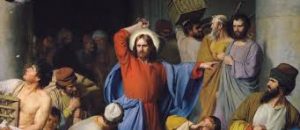HOMILY WEEK 33 05 – Year I
Living Temples of the Word:
(1 Macc 4:36-37; 52-59; Ps29; Luke 19:45-48)
********************************************
When was the last time you were spellbound by someone’s words?
Today’s liturgy extends a double invitation to us: not just to be “spellbound” by the words of Jesus, but to actually be a temple of the Word.
Both readings focus on the temple. That was the center of the cultural, political and spiritual life for the ancient Israelites after the first temple was built by King Solomon. Before that, God journeyed with God’s chosen people in a tabernacle in a tent. The temple was where God dwelt, where God was present here on earth.
In the first reading, the glorious temple had been desecrated by the Gentiles, a desolating disgrace to the Jews. Once the Maccabees had overcome their enemies under Mattathias and his son Judas, the first order of business was the restoration of the temple, with joyful fanfare that would become an annual celebration.
 In the gospel, the temple has also been desecrated, only now it was by the Jews themselves who had turned it into a place of commerce with the sale of sacrificial animals and birds. Worse than that for Jesus, it had also become a source of injustice to the poor, who were being gouged by the jacked-up prices of the sacrifices they were forced to buy. Plus, the court of the Gentiles had become a market place, so they were literally driven out of the temple. No wonder Jesus was filled with righteous anger and cleansed the temple.
In the gospel, the temple has also been desecrated, only now it was by the Jews themselves who had turned it into a place of commerce with the sale of sacrificial animals and birds. Worse than that for Jesus, it had also become a source of injustice to the poor, who were being gouged by the jacked-up prices of the sacrifices they were forced to buy. Plus, the court of the Gentiles had become a market place, so they were literally driven out of the temple. No wonder Jesus was filled with righteous anger and cleansed the temple.
Actually, that was also historically fitting, because one of the roles of the Messiah when he would come was to restore the glory of God to the temple – the shekinah of God that had failed to come back to the second temple when it was dedicated. In John’s account of this incident, Jesus actually refers to himself as the temple where God dwells (“Destroy this temple and in three days I will raise it up.”)
What is striking is that in almost the same breath, Luke mentions Jesus was also “teaching in the temple every day.” That is significant, because that puts the focus on the Word of God within the temple walls. Especially significant was that the common people, unlike the scribes and Pharisees, hung onto Jesus’ words.
Jewish religious life was centered on two pillars: the temple and the synagogue. The temple was where animal sacrifice took place to please God, and the synagogue was where the Word of God, the Torah, was proclaimed and discussed. The fact that Jesus was continually teaching in the temple was a bringing together of the Word of God with sacrificial worship.
It is very interesting that our Eucharist does exactly the same thing – bring together the Word of God with sacrificial worship. The Liturgy of the Word is our synagogue experience, in which we proclaim and break open that Word. Then we move to the table of the Eucharist, where we present to God not animal sacrifices that cannot take away sin, but the sacrifice of the Lamb of God whose gift of his life on the cross does take away the sin of the world.
Our task is to allow ourselves to be touched, profoundly moved, even healed by the power of the Word of God. We need to be “spellbound” by the words of Jesus. One way to do that is to practice Lectio Divina – prayerfully reading God’s word; meditating on it and asking ourselves what God is saying to us this day through that word, praying with that word for our needs and the needs of the world, and finally, must resting in God’s presence in the light of that word, allowing God to do within us whatever God wants to do within us at that moment.
To do this daily and consciously, is to carry the Word of God within us, to ponder it as Mary pondered these things in her heart. We then become temples of the Holy Spirit, where God dwells here on earth. That actually flows from the event of Pentecost, when the shekinah or glory of God did come back to the temple – not a physical temple in a geographical location, but the temple of the early Christians gathered in the upper room, that birthed the Church and transformed our ancestors in faith into the Body of Christ.
As stated earlier, the Eucharist is both synagogue and temple, bringing together the word and sacrificial worship. May our celebration empower us to respond to that double invitation: to continually be spellbound by Jesus’ words, and to be living temples of the Word in our world, everywhere and every day.



